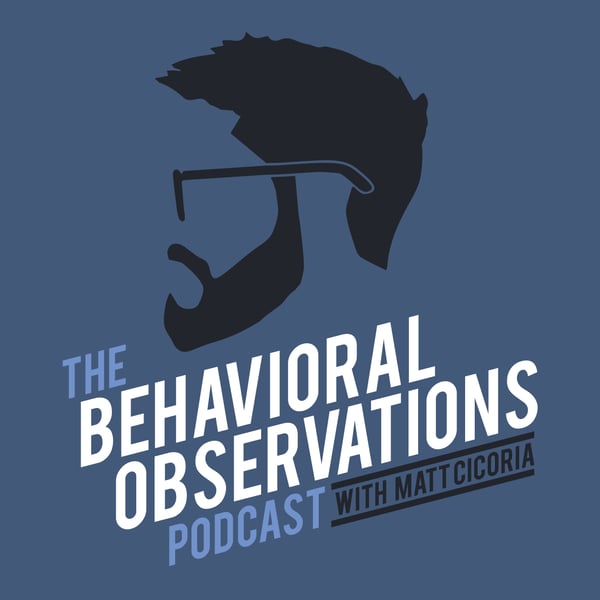From Newly-Minted to Confident Practitioner: ACSS 6
The Behavioral Observations Podcast with Matt Cicoria
Matt Cicoria
4.8 • 648 Ratings
🗓️ 18 November 2022
⏱️ 73 minutes
🧾️ Download transcript
Summary
In the 6th installment of the Apollo Case Study Series, I'm joined by my regular conversation partner, Dr. Jim Moore, along with Christina Nylander. Christina is a BCBA who works at Apollo's Lawrenceville, GA clinic.
In this episode, Christina opens up quite a bit and describes how she encountered Applied Behavior Analysis, her early experiences as an RBT, the mentoring and supervision she's received as a BCBA in the early stages of her career, the value of learning about typical child development, the successes she's had as a clinician, learning the PEAK curriculum, and much more.
Christina quite vulnerably discussed juggling the immense challenges of being a working mother in our field as well. From sleep deprivation to feeling like one is never fully caught up... she candidly describes how she navigated that process.
Throughout the podcast, Jim related Christina's points to Apollo's unique clinical and supervision models. If you are interested in learning more about what they do, you can find more information here.
Here are some of the resources we discussed:
- Prior Apollo Case Study podcasts.
- Making the Science Part of Your Practice, Session 167.
- Rapport Building and Instructional Fading Prior to Discrete Trial Instruction: Moving From Child-Led Play to Intensive Teaching (Shillingsburg, et al., 2019).
- Last year's Verbal Behavior Conference. For those who are interested, the 2023 VBC (disclosure: VBC is a podcast sponsor).
In parting, I have two requests:
First, if you have any questions about this episode or any other ACSS podcasts, I encourage you to hit Jim up on LinkedIn.... even if it is just to say hello. Second, please share this show with friends and colleagues. I think Christina's story is highly representative of many people in the field right now, and this podcast may be helpful to quite a few BCBAs out there.
Transcript
Click on a timestamp to play from that location
| 0:00.0 | Welcome to the behavioral observations podcast, stimulating talk for today's behavior |
| 0:14.0 | analysts. |
| 0:15.3 | Now here's your host, Matt Sequoria. |
| 0:19.1 | All right, everyone. |
| 0:20.3 | Thank you for joining me in the sixth installment of the Apollo case study series. |
| 0:25.4 | We usually are joined just by Dr. Jim Moore, but we're also joined by Christina Dylund, another |
| 0:31.3 | BCBA at the Apollo or within the Apollo, I guess, array of branches. So folks, welcome to the show today. |
| 0:41.2 | Thank you. Thanks for having us. |
| 0:44.0 | Yeah. One of the things I want to do, there's a lot of things we want to get to here. |
| 0:47.9 | And Jim, I think you had a lot of ideas for where to take this discussion. So like we did with Jennifer, I'm going to turn the Q&A over to you. I'll jump in if I have thoughts to offer. There's probably going to be some areas where I can't help but to chime in. But for the most part, I'm going to turn the reins over to you to lead a discussion. So with that, |
| 1:12.4 | having been said, let's go. Great. Thanks, Matt. And thanks, Christina, for your willingness and |
| 1:19.7 | eagerness to be on the podcast. We plan this based on some feedback we've gotten. We've been to a |
| 1:25.7 | couple of conferences in the last few weeks. |
| 1:28.4 | And I've been just kind of overwhelmed by the number of folks who have sought us out |
| 1:32.8 | to thank us for doing the podcast, to talk to us, ask questions. |
| 1:37.8 | And so I've been soliciting feedback saying, hey, what are some things you'd like to hear? |
| 1:43.8 | And I'm going to try to incorporate the two biggest pieces of feedback in today's episode. |
| 1:48.4 | The first one was, hey, we would like to hear from more of your BCBAs, especially those who may not have had any training and experience on the nuances of your clinical model. |
| 2:01.1 | And then we're going to talk a little bit more about our scientific approach to problem solving. |
| 2:05.9 | But I think it's behavioral observations tradition to start every guest off by telling us a little bit about yourself, |
| 2:14.4 | Christina, and tell us how you got into behavior analysis. |
| 2:19.9 | Yeah. Thanks for having me on. |
... |
Please login to see the full transcript.
Disclaimer: The podcast and artwork embedded on this page are from Matt Cicoria, and are the property of its owner and not affiliated with or endorsed by Tapesearch.
Generated transcripts are the property of Matt Cicoria and are distributed freely under the Fair Use doctrine. Transcripts generated by Tapesearch are not guaranteed to be accurate.
Copyright © Tapesearch 2025.

